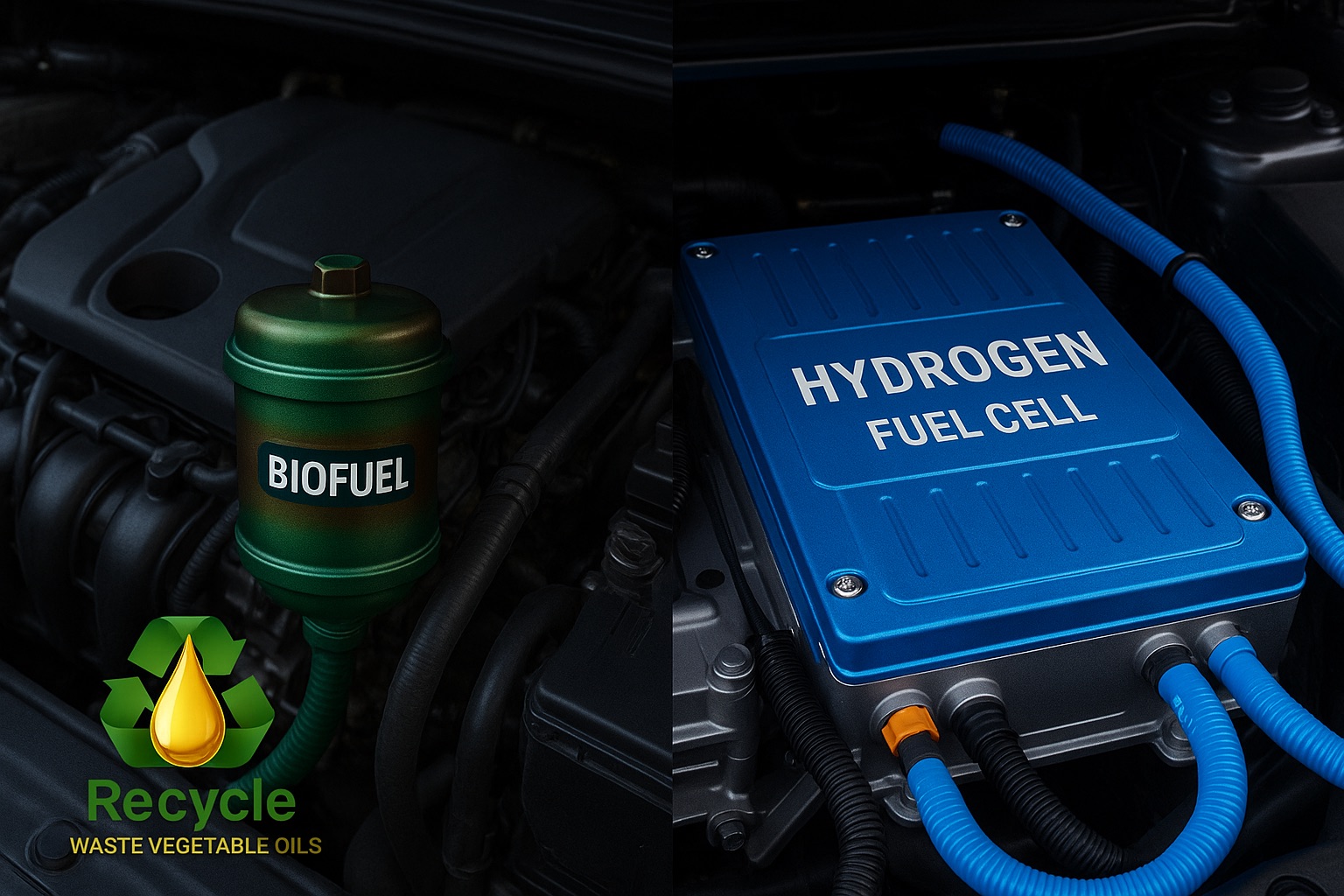Home / Contact Us / About Us / Our Services / North Yorkshire / East Riding Yorkshire / South Yorkshire / West Yorkshire / Greater Manchester / Derbyshire / Reference / FAQ

The Evolution of Energy - Biodiesel Vs Hydrogen
The history of transportation and energy is a testament to human innovation. Each advancement, each new power source, and every engine upgrade reflects our determination to move faster, go further, and live more efficiently. From the humble beginnings of horse-drawn carts to the emergence of hydrogen-powered hybrid vehicles, our journey has been nothing short of revolutionary. This transformation has been gradual, yet impactful-shaping the way we move, live, and interact with the world around us.
The Horse and Cart Era: Simplicity in Motion
Long before engines and exhaust pipes, people relied on horses for mobility. Horse and cart systems represented the first organized mode of personal and commercial transport. Although slow and limited in range, this method connected people and goods, supporting economies and shaping early towns and cities. Despite the simplicity, these systems laid the groundwork for the structured roads and transport networks we rely on today.
The Rise of Steam and Coal Power
The industrial revolution marked a pivotal shift. Steam power, driven by coal, replaced animal power in many industries. Trains, powered by enormous steam engines, revolutionized trade and travel. Coal became the backbone of industrial expansion, but its environmental and health costs were significant. Pollution, mining degradation, and inefficiency raised early questions about the sustainability of fossil energy.
Fossil Fuels: Petroleum and Diesel Take Over
With the invention of the internal combustion engine, petroleum and diesel began to dominate. Cars, trucks, ships, and even airplanes ran on refined fossil fuels. The world’s mobility accelerated. Global supply chains grew. The modern city, complete with highways, logistics systems, and commuter networks, was built on petroleum's power. But this leap came at a cost: rising greenhouse gas emissions, geopolitical dependence, and an increasing need for more sustainable alternatives.
The Biofuel Transition
As awareness of environmental degradation grew, so did the demand for cleaner energy. Biofuels emerged as a sustainable option, particularly those derived from waste vegetable oils and animal fats. Unlike fossil fuels, biofuels are renewable, biodegradable, and can be produced locally. Converting waste oils into fuel not only reduces landfill use and carbon emissions, but also supports a circular economy by turning waste into a resource.
Modern engines are now designed to work with biofuel blends, offering the same performance with significantly reduced emissions. Waste vegetable oil, when properly filtered and processed, can be used as biodiesel in compliant engines. This not only saves money for businesses but contributes to a healthier environment.
Electric Vehicles and a New Age of Power
Electric vehicles (EVs) have become increasingly popular. Advances in battery technology and infrastructure have made EVs more viable for daily transport. From compact city cars to long-range luxury vehicles, electric power is transforming the transport sector. EVs produce zero emissions at the point of use and are supported by growing networks of renewable electricity generation. Though challenges remain-such as battery recycling and grid demand-the trajectory is clear: electrification is here to stay.
Hydrogen Hybrids: The Next Evolution
Hydrogen fuel cells represent the next frontier in clean mobility. These systems generate electricity through a chemical reaction between hydrogen and oxygen, with water being the only emission. Unlike traditional EVs, hydrogen-powered vehicles can be refueled in minutes and offer greater range, making them ideal for freight, buses, and high-usage fleets.
Hydrogen electro-hybrids combine the advantages of both electric and hydrogen systems, bridging the gap between fast refueling and low emissions. Governments and industries are now investing heavily in hydrogen infrastructure, seeing it as a key component in reaching net-zero targets. This technology is still in its early stages but holds incredible promise for large-scale clean transportation.
The Future: Clean, Free, and Possibly Anti-Gravity?
If the pattern of innovation continues, the future may hold even more radical solutions. Concepts like universal energy and anti-gravity propulsion are being explored by physicists and private aerospace firms. Though speculative, these ideas point to a world where energy is abundant, clean, and freely available to all.
For now, the focus remains on scalable, proven technologies like biofuels, EVs, and hydrogen hybrids. These offer practical solutions today while laying the foundation for even more ambitious innovations tomorrow.
The Role of Waste Vegetable Oils in the Energy Transition
Waste vegetable oils play an increasingly important role in the biofuel economy. Collecting, filtering, and converting these oils into biodiesel reduces pollution, cuts carbon emissions, and prevents fats and greases from entering waterways or landfill. For restaurants, food manufacturers, and commercial kitchens, recycling waste oil is not just environmentally responsible-it’s also financially beneficial.
Service providers who specialize in waste oil collection offer a vital link in the sustainability chain. By ensuring proper handling and reuse, they support green fuel production and help businesses meet environmental standards. As more governments enforce sustainability regulations, waste oil recycling will continue to grow as a core element of the clean energy movement.
Conclusion: Step by Step Toward a Cleaner World
Innovation in energy doesn’t happen overnight. It evolves. From the horse-drawn carts of the past to the hydrogen-powered fleets of tomorrow, each stage brings us closer to a cleaner, smarter future. Biofuels, electric vehicles, and hydrogen hybrids aren’t just trends-they are stepping stones in a broader transition.
By embracing sustainable practices like recycling waste vegetable oils and supporting clean transport solutions, we contribute to a better world. The future of energy lies not in a single breakthrough but in the accumulation of smarter, greener choices made by people, businesses, and communities every day.






